INTERVIEW: Jonathan Levine on Directing Seth Rogen, Charlize Theron in LONG SHOT
Director Jonathan Levine’s entire filmography to date might have led him up to directing Seth Rogen and Charlize Theron in their upcoming rom-com Long Shot.
From his early film The Whackness, one of those runaway Sundance hits that mostly found its audience long after it left theaters, to first working with Seth Rogen and producing partner Evan Goldberg to direct the cancer dramedy 50/50,and again a few years later for the holiday comedy The Night Before. Heck, even the Y.A. genre romance Warm Bodiescould be seen as a precursor for the romantic angle in Long Shot.
In the movie, Rogen plays Fred Flarsky, an edgy political reporter always taking on the administration, who attends a fundraising party with his best friend (O’Shea Jackson Jr.) where he’s clearly out of place. From across the room, he spots Charlize Theron’s Charlotte Field, a powerful and influential woman who is about to make a Presidential run. It just so happens that decades earlier, Charlotte was Fred’s babysitter, one on whom he had a huge crush.
As they catch up, Charlotte learns that Fred is a writer and decides to bring him on board to help with her speeches. One thing leads to another, and… well, it is a romantic comedy, one very much in the vein of Rogen’s earliest role in Judd Apatow’s Knocked Up.
If you’re a fan of previous comedies produced by Rogen and Goldberg, you may think you already know what to expect, but there’s lots of surprises in Long Shot, as should be expected when you have a screenplay written by Dan Sperling (The Interview)with Liz Hannah, the Oscar-nominated writer of Steven Spielberg’s The Post.
The Beatspoke with Levine a few weeks back, and it just happened that we got on the phone with him just as the Star Wars: The Rise of Skywalkertrailer debuted, and though he offered us a real-time running-commentary, we decided to talk about his movie instead.
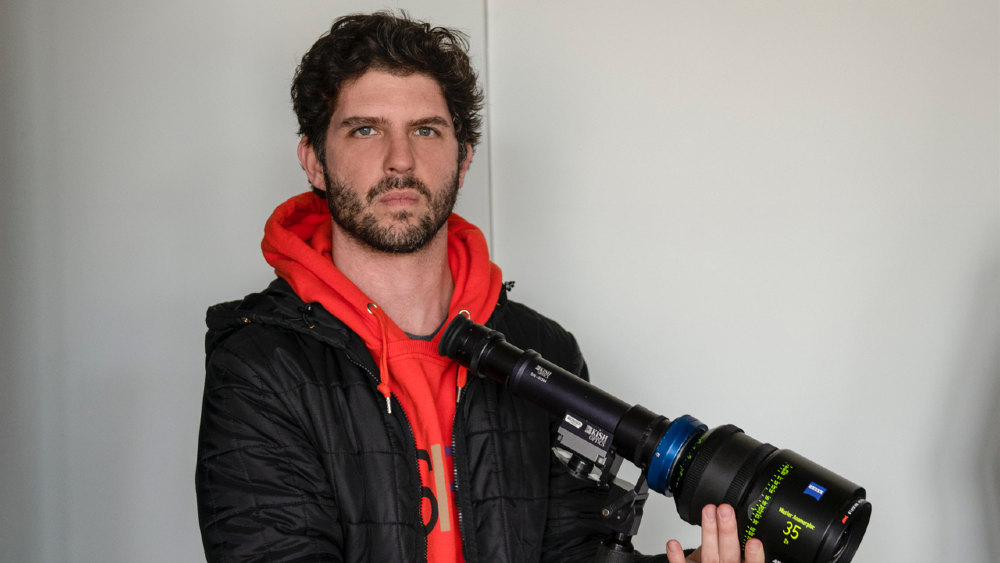
THE BEAT: I remember we spoke two years ago right before “Snatched” and “I’m Dying Up Here” came out. This was already on the horizon, and you were going to shoot in a few months, so did you find this script on your own or did Seth or someone else bring it to you?
JONATHAN LEVINE: Yeah, Seth brought it to me, but James Weaver, who is his producing partner, was the big champion of this script. Dan Sterling wrote this script many, many years ago, even before he wrote The Interview. In fact, that’s why the guys hired him to write The Interview, because they saw that he had a facility for doing political stuff that was also funny. I read it many years ago – Charlize was not yet attached. I think I was making Warm Bodies, and I couldn’t commit to it, then I’m sure they went off on a journey with it. Once Charlize came on, It came back to me, and it was just an opportunity that I could not pass up. I really, really fell in love with it.
THE BEAT: I’m surprised that the script has been around that long, and the script was called “Flarsky” through most of that, which I’m sure didn’t help.
LEVINE: It was always called Flarsky. I mean, maybe that’s the only reason I directed it, because the other ten directors wouldn’t even look at it past the title page. Maybe that’s how they ended up with me. But we always knew that we didn’t want it to be called “Flarsky,” but it was called “Flarsky” until it wasn’t.
THE BEAT: It almost follows what Seth did in Judd Apatow’s “Knocked Up” very early on, where he’s teamed with this really beautiful blonde actress again, but it’s been so long and this is just such a different movie from that.
LEVINE: It was definitely something we talked about as a tonal reference certainly, but I think for us, with this movie, we were trying to give you a little bit of the same but then push you in a new direction, too. The sameness of the premise and the romantic comedy of it, and the “Knocked Up” of it all was the warm blanket that would allow us to challenge ourselves and push our work into a more mature, sophisticated place. We were trying to do a little bit of both.
THE BEAT: But it’s not too sophisticated, which is probably why I liked it.
LEVINE: No! F*ck no, man! No, no… we know what we’re good at, but at the same time, even though we certainly do have raunchy jokes, and there’s a lot of sex and there’s some drugs. We were very conscious to not rely on the old bag of tricks with this movie, as much as we could. We did not want to lean on low-hanging fruit. That’s not to say… We still love comedy, and we love what makes people laugh, and quite often, there are easy laughs that we will happily take. When our character is doing drugs, she is then met with the challenge of negotiating a hostage situation, so we added new wrinkles to the mix that we felt would make it feel new. And we also were much more willing to go to emotional places, and we were willing to go longer without having a joke to lean on. That felt like it was taking us out of our comfort zone a little bit, too, in a way that I like.
THE BEAT: I saw screenwriter Liz Hannah’s name credited, so at one point was she brought on? This is such a different movie obviously than “The Post”…
LEVINE: It is. So basically, the way it went down is that Dan wrote it many years ago when Obama was President, and the President in that draft was kind of a movie President that has a strong jaw and wants to do a really good job and fight for all Americans. Almost like a movie President that you would see at any point in the history of American cinema. We knew, given the political climate, things change so much over the course of this movie or the development of this movie that we knew that we really needed to update it and make it feel modern. Not only did we need to, we really wanted to. We embraced that challenge. At that point, once we sort of ramped up and we knew we were gonna shoot it, that’s when Seth and I brought Dan into the fold to rewrite his own material, but we also wanted to get both a female perspective, and we had read Liz’s script for The Post, so we were just really excited about working with her, too. So all four of us holed up in Seth’s apartment in New York. Liz was on set of The Post, and she would come to Seth’s house after her on-set days with some good Spielberg anecdotes, and we would all write. We would put the script up on Airplay, and we’d put the final draft on Seth’s TV, and we would all write together, and then Liz would go off and take it and continue in whatever direction we had figured out that day or days prior. What’s great about Liz, first of all, I love her writing, but she can just churn stuff out. We would outline together on the big screen, and then she would go home and write 45 pages of Act 1 or Act 2 by the next morning. That was really helpful to us, because we were ramping up towards production.
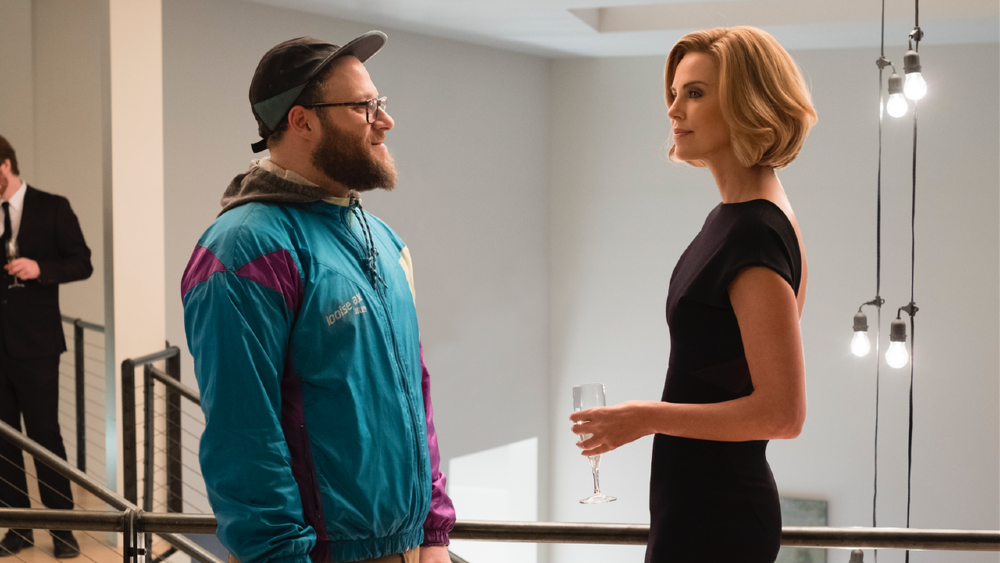
THE BEAT: Did you feel that she had the same comedy instincts as you and Seth, so it was easy for her to throw in some jokes you might not have come up with yourselves?
LEVINE: Yeah. I mean, it’s actually interesting. Even myself, who I consider now to be pretty funny, when I first started working with Seth, I would not suggest a single joke, because it’s just embarrassing. You’re with one of the funniest people in the world. You don’t want your dumb joke to even enter the conversation. I think in the beginning, that certainly wasn’t what we brought her on for. We brought her one to write the story, and at the beginning, I’m sure she was a little intimidated to write jokes, but by the middle of it, she was writing jokes and a lot of them made it into the movie. I think that the thing about these movies is that the jokes can usually come last, because you want the movie to work as a drama, you want the movie to work as a romance, you want to work as its own story without jokes, because that’s the most important thing. That’s how you know you have a good story, and you can always add jokes, especially when the scenarios are charged and have tension and conflict, jokes really come easily. Especially when the characters are are sharply drawn as these two characters, the idealist who always gets in his own way and the overly-pragmatic person who is forced to tolerate him. And yet, it also finds that he’s sort of reigniting something from her past that’s reminding her of the young idealist that she wanted to be before she spent a lifetime making compromises. That, I think is a very salient, distinct conflict at the heart of it that would allow for infinite permutations of jokes.
THE BEAT: I may have asked you this for one of the other movies you did with Seth, but this is your third time working with him as an actor-slash-producer. I know you spend a lot of time developing the script, but when you get on set, is there still the freedom to riff?
LEVINE: Oh, yeah! I would say that you would not even [hear] a single word from the script… no, that’s a big of an exaggeration. We always change it, all the time, and Seth, I think, strangely, is usually allergic to saying the exact dialogue. I think part of his naturalistic approach to acting means that he just needs to change the words on the day, because that’s what a human being would do. A human being would not say a scripted word – a human being would say how they feel in the moment based on the intention that they have. He doesn’t like to say the words as written, regardless of whether he even says the line, but then, Charlize, who I’m sure has worked in many different ways but has never worked this way. Once she got into the mix, and she saw how f*cking bananas the way we work is, she loved it, and she was able to hang, and in fact, really really embraced the notion that you’re not saying the same thing on Take 1 as you’re saying on Take 2. If you show up in the morning, and something about the scene isn’t sitting well, me, Charlies, Seth and any number of on-set writers that we have – because we have three on-set writers. Quite often, Evan Goldberg is there, who is a producer and is one of the best comedy writers in the history of the medium. Genre? Whatever it is… They’ll be there, and we’ll rewrite the scene in ten minutes on the day. Maybe ten minutes is too glib, but we will rewrite things until they’re right. And if they’re not right, we will go sit in the room and tell people, “We need 20 minutes, we need 30 minutes…” The whole crew will go get a coffee, and we’ll work through it until it is right. That’s a wonderful, wonderful way to work. That freedom is truly incredible, and I think actors really enjoy it, too. It can seem a little crazy sometimes, but my job as director is to pretend it’s not crazy, so that people don’t think it’s too crazy.
THE BEAT: What about the rest of the cast? I’m speaking to O’Shea later, and I like seeing him do comedy because I liked him in “Ingrid Goes West.” I’m sure I’ve seen June Diane Raphael in other things…
LEVINE: She’s on Grace and Frankie. I had never really seen her in that much myself. I had seen her on… she did a webseries called Burning Love, and I know that the guys had worked with her. She had small roles in Blockers, and they had worked with her on a few other things. She came in and auditioned, and I thought she was amazing and really, really great. Then Seth told me how funny she was, and what was interesting is that in her audition, she was funny enough, but she was really just nailing the dramatic side of it. I really believe she was the person. I really believed the stakes. I really believe this female friendship and how important it was for her to support this other woman, whose success represents everything to her. I really believed all that, and then on top of that, to hear from Seth that she also was a brilliant improviser, that was an amazing gift. On-set, she was just incredible, and I think she did such a great job with the role, and that’s something about the casting of this movie. When I say we didn’t want to lean on the old bag of tricks, I think we wanted to pepper the film with people you had never seen in a Seth Rogen movie before, because I think what we really wanted was to make the world believable and the stakes of the relationship believable. I think if one of the guys from This is the Endwas playing the Chief of Staff, you would not be feeling that. It might be funny, but you would not be feeling that it was a realistic situation. That’s where you get wonderful actors like Andy Serkis and Bob Oedenkirk and Alexander Skarsgard. We wanted people who we knew could really nail the reality of it, but also, we found these amazing… who thought that Alexander Skarsgard was funny? We wrote the role funny, but we also wrote the role in a way that if he wasn’t that funny, it still would have been fine, but then he was like the funniest motherf*cker ever. And was totally game to do anything you asked him to do, so that was a wonderful revelation as well.
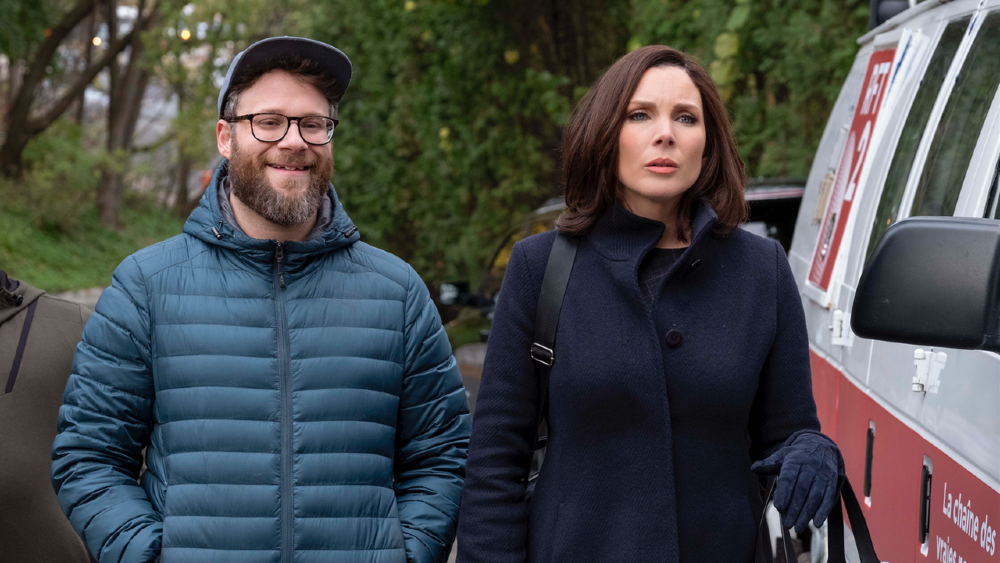
THE BEAT: Has anyone else realized that was Andy Serkis playing Parker Wembley? I didn’t realize it at first. Obviously, he’s done a ton of performance capture, but that character was just so insane. How did you end up with Andy Serkis in latex playing this comically awful politician?
LEVINE: We thought we were casting Andy Serkis, just the normal Andy Serkis, who you don’t see very much. I think the only thing I saw him in was Black Panther andAvengers…
THE BEAT: “13 Going on 30” – he had a great role in that..
LEVINE: Wait, really? Is he?
THE BEAT: He played one of Jennifer Garner’s co-workers or bosses…
LEVINE: I’ve seen that movie. I need to rewatch that. Maybe Andy Serkis just really loves romantic comedies. The prosthetic idea was all his, and I said, “Are you sure? Because who the fck wants to get to work six hours early every day to put on prosthetics?” But Andy Serkis does. I think this is how he gets into character and how he accesses the characters, through behavior and through clothes and through look. So many of the best actors do it that way, and I just thought it was a wonderful gift that he added to the movie and such great instincts on his part. As a director, I’m there to monitor that, and I think that if it felt like it was going awry and a really bad idea, I obviously would have put a stop to it, but what I love about the sets of these movies is that people do feel comfortable bringing those ideas to the table. More often than not, my response is, “Yeah, fck it! Let’s see how that goes!” I think it brings an energy to the thing that you wouldn’t otherwise get, and I think it allows the performers to get really excited about what they’re doing as well. I was thrilled that he had that much commitment to this film that he was willing to put himself through that.
THE BEAT: I gotta ask something rather odd. There was one shot of Seth when he’s calling Charlotte, and he’s obviously in Cartagena, Colombia. Did you literally go to Cartagena, shoot that one scene and that was it?
LEVINE: No! We were there for like three days, man!
THE BEAT: Okay, I knew it was Cartagena, because I’ve been there…
LEVINE: No, we did other stuff in Cartagena. So we did… like so they’re walking down the street, and she’s asking him what his favorite sexual position is. We tell you it’s Portugal but it’s Cartagena. They’re sitting in a square… it’s part of the “Getting to Know Each Other” montage, when he asks about her favorite song and she says, “It Must Have been Love.” We did one day in Cartagena, and then we did a few little pops in Cartagena, and then all that stuff on the beach was on an island off of Cartagena. So we got a lot of use out of Cartagena, and we also had a really good time. That place is fun. You’ve been there? What a beautiful country.
THE BEAT: Great talking to you again. Do you have anything you’re writing for yourself to direct down the road?
LEVINE: Yeah, I’m writing some stuff. I’m probably going to shift focus to some streaming and TV projects for the near future and try to write another movie. I’m just so proud of this movie that I really want to help shepherd it out there and see what new opportunities it affords me in the future. So I’m not jumping into anything else. I also have a beautiful 3-year-old son who is psyched to hang with me.
Long Shot opens nationwide on Friday, May 3. Look for my interview with the one and only O’Shea Jackson Jr. very soon.


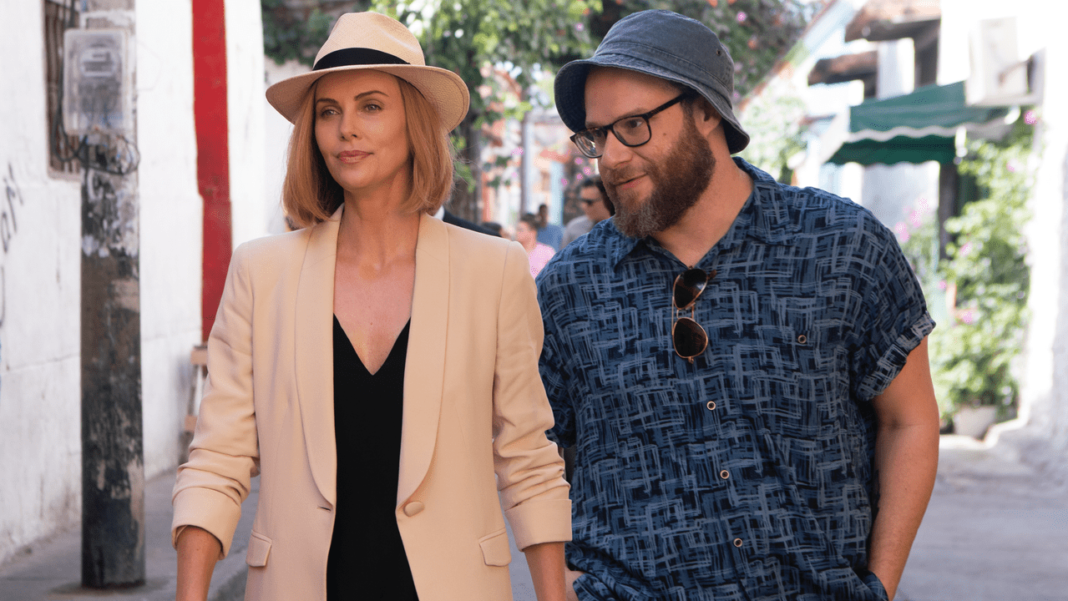



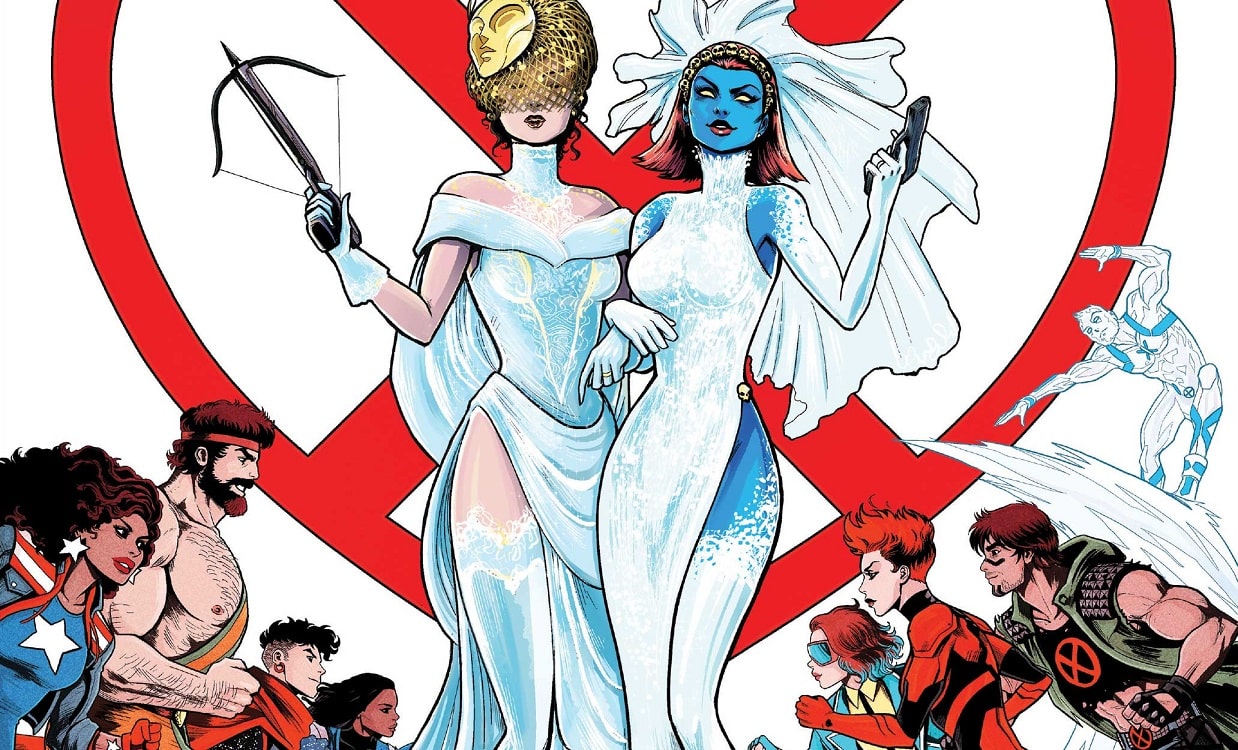

I never thought Seth Rogan was funny. In The Green Hornet he was as miscast as humanly possible. Plus this film has the old sitcom cliche of the dumpy looking guy involved with a beautiful woman. Pass.
Comments are closed.